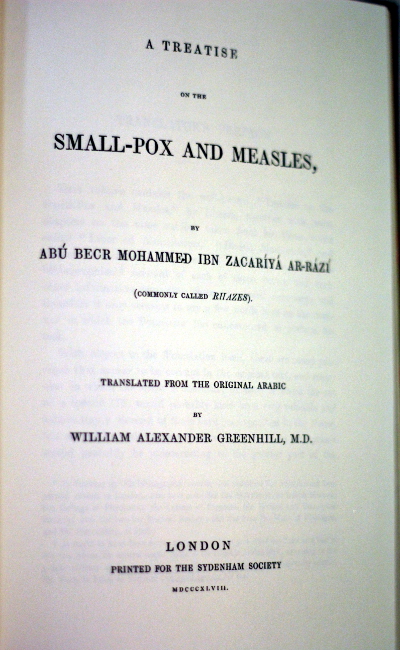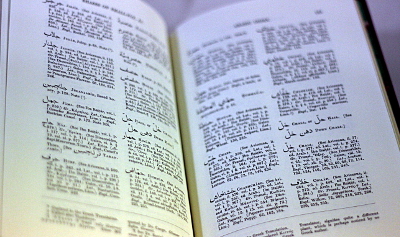About Razi (from Wikipedia):
Rāzī (also known by his Latinized name Rhazes or Rasis) (854 CE – 925 CE), was a Persian polymath, physician, alchemist and chemist, philosopher and important figure in the history of medicine.
Razi’s book: al-Judari wa al-Hasbah (On Smallpox and Measles) was the first book describing smallpox and measles as distinct diseases.It was translated more than a dozen times into Latin and other European languages. Its lack of dogmatism and its Hippocratic reliance on clinical observation show Razi’s medical methods. For example:
“The eruption of smallpox is preceded by a continued fever, pain in the back, itching in the nose and nightmares during sleep. These are the more acute symptoms of its approach together with a noticeable pain in the back accompanied by fever and an itching felt by the patient all over his body. A swelling of the face appears, which comes and goes, and one notices an overall inflammatory color noticeable as a strong redness on both cheeks and around both eyes. One experiences a heaviness of the whole body and great restlessness, which expresses itself as a lot of stretching and yawning. There is a pain in the throat and chest and one finds it difficult to breathe and cough. Additional symptoms are: dryness of breath, thick spittle, hoarseness of the voice, pain and heaviness of the head, restlessness, nausea and anxiety. (Note the difference: restlessness, nausea and anxiety occur more frequently with ‘measles’ than with smallpox. At the other hand, pain in the back is more apparent with smallpox than with measles). Altogether one experiences heat over the whole body, one has an inflamed colon and one shows an overall shining redness, with a very pronounced redness of the gums.”(Rhazese, Encyclopaedia of Medicine)
A comprehensive thinker, Razi made fundamental and enduring contributions to various fields of science, which he recorded in over 200 manuscripts, and is particularly remembered for numerous advances in medicine through his observations and discoveries. An early proponent of experimental medicine, he became a successful doctor; he was appointed a court physician, and served as chief physician of Baghdad and Rey hospitals. He was among the first to use humorism to distinguish one contagious disease from another and has been described as a doctor’s doctor, the father of pediatrics, and a pioneer of ophthalmology.
As a practicing physician, Razi wrote a pioneering book about smallpox and measles providing clinical characterization of the diseases. Through translation, his medical works and ideas became known among medieval European practitioners and profoundly influenced medical education in the Latin West. Some volumes of his work Al-Mansuri, namely “On Surgery” and “A General Book on Therapy”, became part of the medical curriculum in Western universities. As a teacher of medicine, he attracted students of all backgrounds and interests and was said to be compassionate and devoted to the service of his patients, whether rich or poor. Edward Granville Browne considers him as “probably the greatest and most original of all the physicians, and one of the most prolific as an author”.




